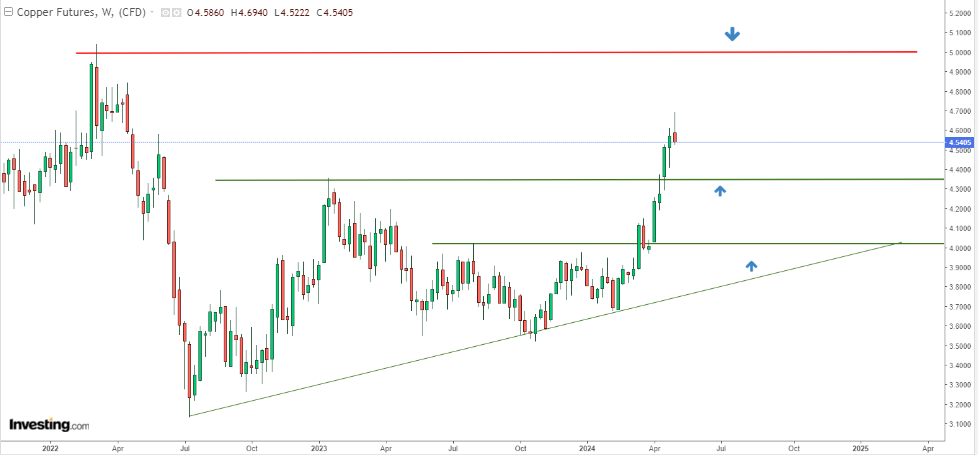Buy tech sell-off, Wedbush’s Ives says: ’this is a 1996 moment, not 1999’
- Copper prices have surged in the last three months, driven by robust demand from various industries.
- China's positive economic data further strengthens the case for a potential rise in copper demand.
- BHP's takeover attempt of Anglo American highlights the intense competition expected in the copper market for years to come.
- In 2024, invest like the big funds from the comfort of your home with our AI-powered ProPicks stock selection tool. Learn more here>>
Copper prices have skyrocketed in the past three months, reaching their highest levels since last April.
This surge is primarily because of a surge in demand from the automotive, artificial intelligence, renewable energy, and traditional industries.
Going forward, China's recent positive economic data further strengthens the case for a potential increase in copper demand from the country. 
The mining giant BHP Group's (NYSE:BHP) recent attempt to acquire Anglo American (OTC:NGLOY), though initially rejected with a $39 billion offer, underscores the intense competition expected in the copper market for years to come. This signals the immense potential of copper as demand surges in the coming years.
Soaring Demand Ahead as Supply Struggles to Keep Pace
Forecasts predict a 30% to 50% increase in copper demand by 2035, driven by the expansion of renewable energy technologies and electric mobility, which aims to reduce carbon emissions from coal usage. Copper's excellent conductivity, similar to silver whose prices are also rising, makes it crucial for these advancements.
For instance, electric vehicles require roughly twice the copper compared to traditional cars, and data center growth associated with AI development in the US alone could increase global demand by 2% within the next few years. Additionally, copper is a key material in photovoltaic panels and windmills, further solidifying its price increase potential.
The supply side, however, may struggle to meet this anticipated demand surge. This is evident in factors like reduced output at Ivanhoe Mines (OTC:IVPAF), the closure of the Cobre Panama mine, and major Chinese smelters cutting production by 5-10%. The embargo on Russian raw material supplies to UK and US exchanges further disrupts supply in key trading centers.
In the short term, we see declining LME (London Metal Exchange) stockpiles, reaching their lowest levels in three weeks. This indicates sustained pressure on copper prices in both the short and long term, potentially pushing them towards historical highs.
Technical View: Copper Prices Near Historical Maximums
Following the global monetary policy tightening in 2022 that strengthened the US dollar, copper prices experienced a significant decline, reaching their lowest levels since November 2020. However, the current situation is vastly different. After a strong rally in recent weeks, buyers are approaching historical highs near $5 per pound.

Buyers are likely to target the indicated area as the base scenario, based on the arguments presented earlier. In case of a potential correction, pay close attention to the support levels determined by the previously broken high: $4.40 per pound and the round level of $4 per pound.
***
Want to try the tools that maximize your portfolio? Take advantage HERE AND NOW of the opportunity to get the InvestingPro annual plan for less than $10 per month.
For readers of this article, now with the code: INWESTUJPRO1 as much as a 10% discount on annual and two-year InvestingPro subscriptions.ProPicks: AI-managed portfolios of stocks with proven performance.
- ProTips: digestible information to simplify a lot of complex financial data into a few words.
- Advanced Stock Finder: Search for the best stocks based on your expectations, taking into account hundreds of financial metrics.
- Historical financial data for thousands of stocks: So that fundamental analysis professionals can delve into all the details themselves.
- And many other services, not to mention those we plan to add in the near future.
Act fast and join the investment revolution - get your OFFER HERE!
Disclaimer: The author does not own any of these shares. This content, which is prepared for purely educational purposes, cannot be considered as investment advice.

